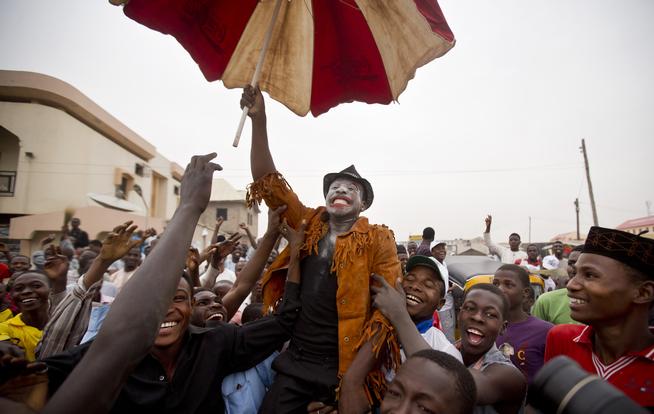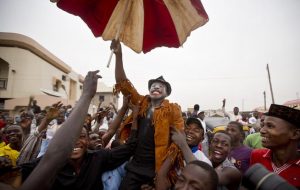Blog
Media Coverage of Elections in Nigeria


[/media-credit] A supporter of opposition candidate Muhammadu Buhari, dressed to represent and mock Nigeria President Goodluck Jonathan, celebrates Buhari’s anticipated electoral victory in Kano, Nigeria. (Ben Curtis, The Associated Press)
The March 28 election has become one of the most talked-about elections in Africa. This election was to break barriers and prove to the world that Nigerians can rise from the ashes into a new season of hope and peace for their nation.
The country is the largest economy in Africa and has a population of over 170 million, according to the British Broadcasting Corporation.
News coverage of the election can be characterized as good, not-so-good, and downright negative.
In Praise of Nigeria
On March 29, a day after the election, writing for CNN, Stephanie Busari states:
Nigeria votes: Forget the candidates, democracy was the real winner
“It was one of Africa’s biggest elections and it didn’t disappoint. There was high drama, violence and tensions but most of all an electorate determined to exercise their democratic right to vote.”
On March 31, writing for USA Today, Peter Pham of the Atlantic Council’s Africa Center states “Nigeria Votes, Africa Wins.”
Pham seems to be pouring praise on the Nigerian nation for overcoming the logistical nightmares of organizing the election, to the extent that the outcome was successful.
“The entire continent of Africa is the real winner of Nigeria’s presidential election.”
Minus the logistical challenges and other “imperfections,” Pham adds:
“And, as if all this were not challenge enough, this time the country implemented a new biometric voter identification system in the hope of pre-empting the allegations of fraud that have marred previous polls and which have occasioned post-election riots and violence, including the last time around in 2011, when more than 800 people lost their lives.”
“Second, if a country as large and as socially complex as Nigeria can pull itself together to organize elections which the international community, led by United Nations Secretary General Ban Ki-moon, has generally applauded, there is no reason why smaller countries with far fewer societal fissures cannot do so if the leaders and people but have the political will.”
Writing in the Denver Post on April 11, former governor of Colorado, Bill Ritter Jr., offered praise for the country’s feat in organizing a successful election. Ritter observed the elections on behalf of the U.S. National Democratic Institute. He writes:
“While Nigeria has flirted with democracy over the past several decades, alternating between democratic and military rule, the Nigerians are proud to have managed 16 consecutive years of democratic elections.”
“The aftermath of the election has been marked by the absence of violence, and the public seems to have generally accepted the results. And the process itself, while imperfect at times, was a marked improvement in credibility over the previous elections.”
Not much praise for Nigeria
Yet others presented the reporting in not-so-positive terms. Let’s look at some examples.
In many cases–the country is always described as “filled with corruption and lacks the provision for its fast-growing population.”
An article, written by Ukamaka Olisakwe for the opinion pages of The New York Times on April 9, depicted the struggles his cousin, who is living in Northern Nigeria, is facing.
The writer, who is living in the South, provides a look into the reason why this election is bringing Nigeria change, hoping that the country could have a better turnaround in the hands of Buhari, a former military man.
“In Nigeria, an Election to Believe In.”
Olisakwe writes:
“And in the face of such danger, the misty-eyed man I voted for proved cold and ineffectual. He began speaking not with us but at us, and as if he was in a hurry to leave. His eyes were vacant on television; his touching humility seemed mere timidity. When Boko Haram kidnaped dozens of high school girls a year ago, I wished I could reach into my television, shake him, and ask where he was hiding the president I voted for him.”
This was a good write-up for the New York Times. However, the writer blasted Jonathan but failed to give enough reasons for his vote for Buhari.
Weeks before, there was fear that violence might erupt after the elections were postponed due to the military’s sudden re-engagement on the eve of the vote. There were plenty of speculations that the plan of the ruling party was to gain control of the votes and remain in power.
In Five dangerous weeks for Nigeria, written on February 25, after the postponement of the election, Williams Wallis of the Financial Times states:
“The postponement of Nigeria’s presidential elections on security grounds has flushed into the open scenarios reminiscent of the dark days when the country’s democratic aspirations were stifled by a military cabal.”
Such a description not only discounts the gains that the country has made democratically, it simply cast a shadow of skepticism reminiscent of the days when coup d’états were the norm.
Even while the writer gave some perspective about changes that have taken place, the subject focused more on Nigeria’s past, not its future. We see this in his use of words like “fear,” “disaster scenario,” “ballot stuffing,” “ethnic killings,” “violence,” “Boko Haram” and “war.”
When I searched for information relating to Nigerian news and the elections on the internet, the BBC, The New York Times, and Foreign Affairs Magazine provided the most coverage and up-to-date information, with live feeds to on-the-ground information for those seeking real facts.
Other stories seemed to cast fear about Buhari, the newly elected leader, for having been a “former dictator.”
An article with an attention-grabbing headline on the Denver Post website and written by Michelle Faul and Andrew Drake of the Associated Press is a good example.
Faul, Michelle, and Andrew Drake. “Nigeria Returns Former Dictator to Office, Ousts Goodluck Jonathan.” – The Denver Post
The writer states:
“During his brief 1983-1985 dictatorship he ruled with an iron fist, jailing people even for littering and ordering civil servants who arrived late to work to do squats. He gagged the press and jailed journalists to cover up a deepening economic crisis as prices tumbled for the oil on which Nigeria’s economy depends. He eventually was overthrown by his own soldiers.”
One way to bring fear into the American public is to keep writing about Boko Haram.
In the article by Faul and Drake, they point out the overwhelming win of Buhari in Borno State, the birthplace of Boko Haram. This is to somehow insinuate that most of the voters are Muslims. When you keep reading, there is a fear and threat of Islamic terrorism that is being brought to the fore as the elections loom.
Since the kidnapping of the Chibok girls, who have gone missing for about a year, Nigeria has been in the news. We all know this. There is not a need, in the face of the elections, to insinuate that Nigeria would become an Islamic extremist country if Buhari becomes president.
In other cases, news organizations such as Fox News only spoke about Boko Haram and not much about the elections themselves. As for local radio and TV stations, the reporting happened in typical ten-second sound bites. That means there was no depth to the reporting. Yet, some of the stations are outlets where Nigerians who are living in different parts of the world, get information on what is going on in their home country.
There is a realization in the world of journalism that not all news and information is accurately presented in a fair and balanced fashion. Some of these organizations presented the facts to the public to judge — others presented some truth and mixed them with opinions.
While the examples cited here are not exhaustive, they offer a glimpse of some of the coverage that we have seen. Overall, this wasn’t presented by all news outlets as best as it could have been, and also not to the same degree.
There is still a need for a better job to be done in presenting African issues to the American public. That better job would involve hearing more about what Nigerians in particular, the ones who are directly impacted, have to say about the elections in their country.
One thought on “Media Coverage of Elections in Nigeria”
Leave a Reply
You must be logged in to post a comment.

The attention must be brought to these hidden facts. Great article!